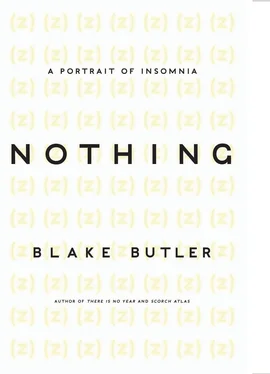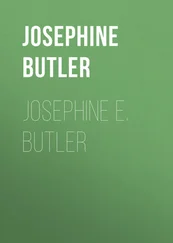]
]
]
One third of America, at some point, has been locked out of sleep by mind or mood. Insomnia is “the most frequent health complaint after pain.”5 It is twice as common in women as in men until the onset of old age, at which point this paradigm becomes reversed — a swing explained for some by menopause. Though, in general, the rule is: the older you get the less you tend to sleep— our thickening inside more time —more than half of those over the age of sixty-five suffer the insomniac complaint. For many, enough nights in this thick circling can be enough to make a person, over time, wish for sleep’s older, more endless brother mode, the one with a front door we all know how to access: the big sleep . Dead and gone. Death and sleep are used interchangeably throughout the Bible, referring to each as instances invoked by god. That dying brings the same shape of turning off as sleep does — a final, most precise iteration of the mode in which we are truly dissolved of our wants and shifting selves — seems at once terrifying and sublime in the same hold. We can, ultimately, always end our own lives, if life turns to that, another constant door waiting to be opened, if in silence. And we remain surrounded, by so many easy sleepers, in their own bodies. And the more you want sleep the harder it becomes.
According to the DSM-IV , Primary Insomnia — that is, insomnia not caused by another mental disorder, a medical condition, or substances—“is often associated with physiological or psychological arousal at nighttime in combination with negative conditioning for sleep.” Often it’s not even the major presences that keep the circle spinning — the catastrophes, the major loom — as these kinds of motion often move in such broad strokes they sit upon the brain like wet. Two other forms of Primary Insomnia — Idiopathic (related to functions established in childhood) and Subjective (where the sleeper misperceives the sleeping state, feeling awake when not, or in shallow holes) — are also considered learned or conditioned states, not of trauma but sunk into the flesh by make of habit or cellular comprise, rather than in trauma of interaction with the air. Instead, it is more so the tiny particularities involved in those big ones, and the routines, as well as reflexive fleshy response to the physical effects of no rest: body aches, slowing of reflex and response rate, jumble of tongue; memory trouble, functional trouble, job absenteeism, higher health costs, depression. These conditions may linger in the body for years, returning even ten years after the main fact of its hold. “In certain respects, insomnia is a euphemism for free-floating anxiety,” writes Henry Kellerman in a 1981 study of sleep disorders, “that is, the insomnia is only a symptom of some more serious underlying disorder that can eventually merge in an unexpected form.”6
A range of secondary insomnias — also termed comorbid —come related to extrinsic factors, not necessarily inherent in the flesh. These include sleeplessness as a result of psychiatric, medical, or central nervous system disorders (panic attacks, dementia, bipolar, to name a few — all in all a set of roughly 75 percent of all psychiatric patients — as well as arthritis, osteoporosis, cancer: “Almost any form of brain insult disturbs the sleep-wake cycle, often causing insomnia at night and hypersomnia during the day”7); substance dependency (nicotine, caffeine, alcohol, and marijuana being most common); problematic breathing (apnea, snoring); environmental cues (sound, heat, illumination, space); sleep-wake scheduling disorders (circadian rhythm, restless legs and moving limbs); and parasomnias (sleepwalking, night terrors, nightmares, and so on). Paradoxical insomniacs misperceive the way in which they actually are sleeping, and actually are awake, caused by flagrant intensities of the room around them — louder sounds and brighter light. Psychophysiological insomniacs are often held awake by intense worrying of day and sleep and time, while otherwise free of factors that perpetuate the ruining. The manifestations of these effects also vary in the way they are turned on. There is sleep-onset insomnia, where the entrance to the sleep period takes longer than thirty minutes after head hits pillow; there is sleep-maintenance insomnia, where the subject does fall asleep but can’t seem to stay under for more than brief bursts, or wakes early without sufficient time elapsed; there are as well a variety of extremities and mixtures of these conditions, a veritable salad of sleep methods in which the sleep light might be deflected.
There are many common ways by which these sleepless forms might in anyone turn on:
General physical symptoms, e.g., old age, female gender (especially after menopause), or a history of depression— a depressive, mothering, ancient door.
Abuse of substances such as psychoactive drugs and stimulants, taking fluoroquinolone antibiotics, or abuse of commonly available sleep aids— a door forced open by the inhuman .
High stress caused through anticipation, fearing, health trouble, poor relationships in love or work, thoughts of money, thoughts of career, thoughts of direction of the life— a craggy, blood-filled hole; a face .
Unfulfilled or absorbed grieving for a loved one, even years after the fact— complex haunting, holes in holes, holes in holes in holes .
Mental disorders, e.g., schizophrenia,8 bipolar, OCD, or as well from neurological disorder in bumping or in lesions, damage— a room accessed by error, via burp folds in the flesh .
Bad sleep conditions, self-inflicted or elsewhere, such as jetlag, and, e.g., light, discomfort, noise— something burning in the windows, something unsoft inside the mattress, screaming sound .
Fear of sleep, from nightmares, or in not knowing, fear of death while in the mind, or of fucked dreams or of unconscious violence carried out on or in the body— fear of nowhere, nothing; fear of the body left unto itself.
One rumor suggesting the presence of flesh-laid parasites causing internal disruption: discomfort, noise— doors inside us .
The internet, or fake light given off of it, or TV— 00101000000110000000000 .
It is entirely the fact of this wide array, and its lack of distinction, overflowing, that there is no one clear culprit for the nature of the loss of sleep. It is an indeterminate disease, tailored per person, if one that might have equally unnamable solutions, ways back out. This, in part, is what makes it so troublesome to nail down, to turn back onto itself, undo. Something inherent in the cells about a person that leads them the wrong way down long halls, certain hours of whole evenings caught under unnameable personal or more general terror overhead — a state of unself-breakable containment, resigned to a room composed of collaged unwindings of the brain, wherein one cannot so much simply stand up of his or her volition, but must wander for some exit to be sprung, trying drugs or drinks or new behaviors, passed from mouth to mouth and head to head. Each night there in a shifting maze of hours and houses, looking for the door, while in the other air, the body waits. The mind against the mind for too long begging only to turn off. Be briefly gone. Sleep as needed practice, the body surrendering its ache. Sleep as eruption, interruption. Sleep as infernal internal camp, where the mind goes to pour itself out, glee in scramble, torment the conscience at last full in its grasp.
For me, even now, on bad nights, the act of first getting into bed is as if searching for a puzzle into which I can fit my piece — submersion into a shallowing pool that may or may not let you continue wading deep. Arranging the body at contact on the mattress in my strange frame becomes more than simple math. There is a certain combination of pillow to head wherein the right stretches of the pillow’s bulk fit well with the space around the shoulders and up along the short curve of the neck, fitting in well also with how the skull curves and where the ear feels cupped but not pressed too hard upon. Finding the correct combination of flesh to stuffing can on some nights come fortuitously, on contact, hitting the right grooves in first coming down, or in early iterations of adjustment. Sometimes it takes a little longer still than this, and the rummaging of pillow, skull, and limbs therein continue, disrupting both the comfort-space of whatever regular bedmate you’ve acquired and, when alone, whatever pleasance you might have managed to work yourself into before approaching the bed itself.
Читать дальше












